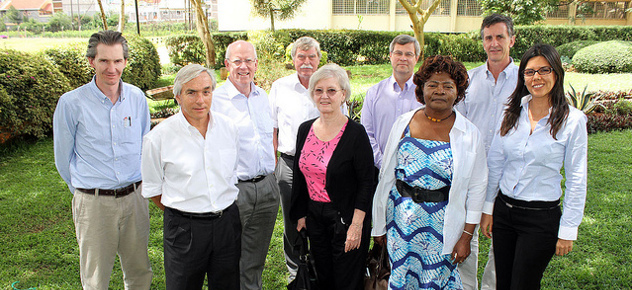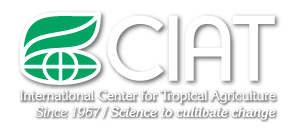Message from the Board Chair and Director General

CIAT’s Board of Trustees, 2014
All too often, strategic plans go on the shelf within months after they’re completed. In contrast, CIAT’s strategy for 2014-2020 went on the road over the last year, and in many ways, it went into effect. We shared the strategy widely with donors and partners, and engaged them in planning innovative initiatives that flow from it.
This audience included many distinguished visitors to CIAT, among them Darren Walker, president of the Ford Foundation, and a group of global science and industry leaders associated with the Latin America Conservation Council (LACC), which works in partnership with The Nature Conservancy (TNC). LACC held its fourth annual meeting at our headquarters in November.
In parallel with strategy outreach, we did some “inreach” as well – holding launch events at Center headquarters and our Asia regional hub in Hanoi, Vietnam, where CIAT is expanding its team, strengthening its partnerships, and widening the scope of its work. The launch events were followed by internal dialogues involving hundreds of staff to discuss each team’s role in implementing the strategy.
Building on biodiversity
One strategic undertaking to which we’re giving special attention involves the creation of a new plant genetic resources hub at Center headquarters in Colombia. For nearly 4 decades, CIAT’s genebank has resided at the heart of our efforts to make tropical agriculture more productive and resilient.
By creating a new state-of-the-art facility, CIAT will be able to provide not only valuable seed but also digital genetic information that helps researchers harness the seed’s development power. CIAT’s host country, Colombia – considered the second most biodiverse country in the world, after Brazil – stands to gain significantly from the new genebank and is actively involved in its planning. The novel facility will conserve biodiversity and play a critical role in making Colombia’s agriculture more competitive, sustainable, and climate smart – key aims of our collaboration with the country’s Ministry of Agriculture and Rural Development (MADR) and Colombian Corporation of Agricultural Research (Corpoica).
The German government recently provided funding for infrastructure that facilitates genebank functions, and this augurs well for our campaign to build further support. The new hub will closely complement the efforts of the Global Crop Diversity Trust, whose executive director, Marie Haga, honored us with a visit this year.
Strategic initiatives in the making
Center scientists are pursuing several other avenues opened up by the strategy, including these three forward-looking initiatives:
- LivestockPlus – Fast-tracking tropical forages for twin-win agricultural systems
- Ecosystem Action – Renewing rural landscapes for improved food security and livelihoods
- FoodLens – Sharpening the focus of research on sustainable food systems
All three form a critical part of CIAT’s effort to make more robust contributions to the evolving CGIAR research agenda.
The initiatives now have well-defined research agendas and are rapidly gaining buy-in through new partnerships. A widely publicized study on changes in global food supplies over the last 50 years – which appeared in the Proceedings of the National Academy of Sciences of the USA (PNAS) – stimulated global interest in our perspectives on food systems. Sizable grants have already been approved for LivestockPlus and Ecosystem Action, one of which (from Germany’s environmental ministry) supports development of sustainable land-use options for climate change adaptation and mitigation in the Colombian and Peruvian Amazon.
Standing room only
In recent months, developments on another major front – climate-smart agriculture (CSA) – have cleared the way for rapid progress toward CIAT’s strategic objectives. Last October, Center experts in climate change presented profiles on CSA for seven countries across Latin America and the Caribbean to a standing-room-only audience at World Bank headquarters. The products prompted support for a similarly ambitious effort with African countries, to be conducted through the CGIAR Research Program on Climate Change, Agriculture and Food Security (CCAFS), which CIAT leads.
This success came on the heels of another climate coup. CIAT scientists were named one of two winners of the Big Data Climate Challenge, which the United Nations awarded at its high-level Climate Summit, held last September in New York City. The award recognized our collaborative work with MADR and Colombia’s National Rice Growers Association (Fedearroz) to help blunt the impacts of climate change in rice production through practical applications of big data tools (read the story).
Thinking big on land restoration
The other winner of the Big Data Climate Challenge was the Global Forest Watch system of the World Resources Institute (WRI), which has recently adopted CIAT’s Terra-i tool for near real-time monitoring of land-use change. We worked with WRI to showcase this joint effort at the Global Landscapes Forum (GLF) 2014, a major event held in December at Lima, Peru, alongside the 20th Conference of the Parties to the UN Framework Convention on Climate Change, or COP20.
During GLF, CIAT also joined WRI and other partners in the high-level launch of Initiative 20×20, which aims to get the restoration of 20 million hectares of degraded land on track in Latin America by 2020. Attended by a half dozen agricultural and environmental ministers and an equal number of CEOs from private investment funds, the launch marked an auspicious beginning for this exciting effort.
The launch was followed by a lively discussion forum, which examined conditions for the success of efforts like Initiative 20×20 and the potential of such schemes for reversing land degradation in sub-Saharan Africa. Throughout 2015 – declared the International Year of Soils by the United Nations General Assembly – CIAT will work with its partners to heighten the profile of soil and ecosystem health.
Those and other advances highlighted in CIAT Annual Report 2014-2015 represent key milestones along the path to eco-efficient agriculture. We invite all of our partners and donors to join us in making the arduous journey to this vital destination, which none of us can reach on our own.

Wanda Collins
Chair, Board of Trustees

Ruben G. Echeverría
Director General
